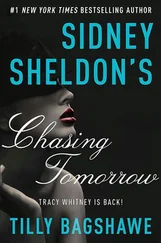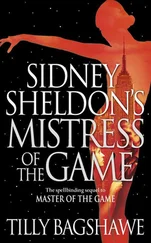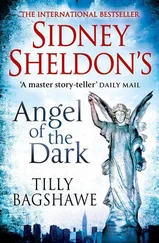“Yes, it was, wasn't it?” a voice agreed.
Jeff turned around. Tracy was seated on a coil of rope, her hair blowing softly around her face.
“Tracy! What are you doing here?”
“What do you think I'm doing?”
He saw the expression on her face. “Wait a minute! You didn't think I was going to run out on you?”
“Why would I think that?” Her tone was bitter.
“Tracy, I left a note for you. I was going to meet you at the Savoy and —”
“Of course you were,” she said cuttingly. “You never give up, do you?”
He looked at her, and there was nothing more for him to say.
In Tracy's suite at the Savoy, she watched carefully as Jeff counted out the money. “Your share comes to one hundred and one thousand dollars.”
“Thank you.” Her tone was icy.
Jeff said, “You know, you're wrong about me, Tracy. I wish you'd give me a chance to explain. Will you have dinner with me tonight?”
She hesitated, then nodded. “All right.”
“Good. I'll pick you up at eight o'clock.”
When Jeff Stevens arrived at the hotel that evening and asked for Tracy, the room clerk said, “I'm sorry, sir. Miss Whitney checked out early this afternoon. She left no forwarding address.”
It was the handwritten invitation. Tracy decided later, that changed her life.
After, collecting her share of the money from Jeff Stevens, Tracy checked out of the Savoy and moved into 47 Park Street, a quiet, semiresidential hotel with large, pleasant rooms and superb service.
On her second day in London the invitation was delivered to her suite by the hall porter. It was written in a fine, copperplate handwriting: “A mutual friend has suggested that it might be advantageous for us to become acquainted. Won't you join me for tea at the Ritz this afternoon at 4:00? If you will forgive the clichй, I will be wearing a red carnation.” It was signed “Gunther Hartog.”
Tracy had never heard of him. Her first inclination was to ignore the note, but her curiosity got the better of her, and at 4:15 she was at the entrance of the elegant dining hall of the Ritz Hotel. She noticed him immediately. He was in his sixties, Tracy guessed, an interesting-looking man with a lean, intellectual face. His skin was smooth and clear, almost translucent. He was dressed in an expensively tailored gray suit and wore a red carnation in his lapel.
As Tracy walked toward his table, he rose and bowed slightly. “Thank you for accepting my invitation.”
He seated her with an old-fashioned gallantry that Tracy found attractive. He seemed to belong to another world. Tracy could not imagine what on earth he wanted with her.
“I came because I was curious,” Tracy confessed, “but are you sure you haven't confused me with some other Tracy Whitney?”
Gunther Hartog smiled. “From what I have heard, there is only one Tracy Whitney.”
“What exactly have you heard?”
“Shall we discuss that over tea?”
Tea consisted of finger sandwiches, filled with chopped egg, salmon, cucumber, watercress, and chicken. There were hot scones with clotted cream and jam, and freshly made pastries, accompanied by Twinings tea. As they ate, they talked.
“Your note mentioned a mutual friend,” Tracy began.
“Conrad Morgan. I do business with him from time to time.”
I did business with him once, Tracy thought grimly. And he tried to cheat me.
“He's a great admirer of yours,” Gunther Hartog was saying.
Tracy looked at her host more closely. He had the bearing of an aristocrat and the look of wealth. What does he want with me? Tracy wondered again. She decided to let him pursue the subject, but there was no further mention of Conrad Morgan or of what possible mutual benefit there could be between Gunther Hartog and Tracy Whitney.
Tracy found the meeting enjoyable and intriguing. Gunther told her about his background. “I was born in Munich. My father was a banker. He was wealthy, and I'm afraid I grew up rather spoiled, surrounded by beautiful paintings and antiques. My mother was Jewish, and when Hitler came to power, my father refused to desert my mother, and so he was stripped of everything. They were both killed in the bombings. Friends smuggled me out of Germany to Switzerland, and when the war was over, I decided not to return to Germany. I moved London and opened a small antique shop on Mount Street. I hope that you will visit it one day.”
That's what this is all about, Tracy thought in surprise. He wants to sell me something.
As it turned out, she was wrong.
As Gunther Hartog was paying the check, he said, casually, “I have a little country house in Hampshire. I'm having a few friends down for the weekend, and I'd be delighted if you would join us.”
Tracy hesitated. The man was a complete stranger, and she still had no idea what he wanted from her. She decided she had nothing to lose.
The weekend turned out to be fascinating. Gunther Hartog's “little country house” was a beautiful seventeenth-century manor home on a thirty-acre estate. Gunther was a widower, and except for his servants, he lived alone. He took Tracy on a tour of the grounds. There was a barn stabling half a dozen horses, and a yard where he raised chickens and pigs.
“That's so we'll never go hungry,” he said gravely. “Now, let me show you my real hobby.”
He led Tracy to a cote full of pigeons. “These are homing pigeons.” Gunther's voice was filled with pride. “Look at these little beauties. See that slate-gray one over there? That's Margo.” He picked her up and held her. “You really are a dreadful girl, do you know that? She bullies the others, but she's the brightest.” He gently smoothed the feathers over the small head and carefully set her down.
The colors of the birds were spectacular: There was a variety of blue-black, blue-gray with checked patterns, and silver.
“But no white ones,” Tracy noticed.
“Homing pigeons are never white,” Gunther explained, “because white feathers come off too easily, and when pigeons are homing, they fly at an average of forty miles an hour.”
Tracy watched Gunther as he fed the birds a special racing feed with added vitamins.
“They are an amazing species,” Gunther said. “Do you know they can find their way home from over five hundred miles away?”
“That's fascinating.”
The guests were equally fascinating. There was a cabinet minister, with his wife; an earl; a general and his girl friend; and the Maharani of Morvi, a very attractive, friendly young woman. “Please call me V.J.,” she said, in an almost unaccented voice. She wore a deep-red sari shot with golden threads, and the most beautiful jewels Tracy had ever seen.
“I keep most of my jewelry in a vault,” V.J. explained. “There are so many robberies these days.”
On Sunday afternoon, shortly before Tracy was to return to London, Gunther invited her into his study. They sat across from each other over a tea tray. As Tracy poured the tea into the wafer-thin Belleek cups, she said, “I don't know why you invited me here, Gunther, but whatever the reason, I've had a wonderful time.”
“I'm pleased, Tracy.” Then, after a moment, he continued. “I've been observing you.”
“I see.”
“Do you have any plans for the future?”
She hesitated. “No. I haven't decided what I'm going to do yet.”
“I think we could work well together.”
“You mean in your antique shop?”
He laughed. “No, my dear. It would be a shame to waste your talents. You see, I know about your escapade with Conrad Morgan. You handled it brilliantly.”
“Gunther… all that's behind me.”
“But what's ahead of you? You said you have no plans. You must think about your future. Whatever money you have is surely going to run out one day. I'm suggesting a partnership. I travel in very affluent, international circles. I attend charity balls and hunting parties and yachting parties. I know the comings and goings of the rich.”
Читать дальше












